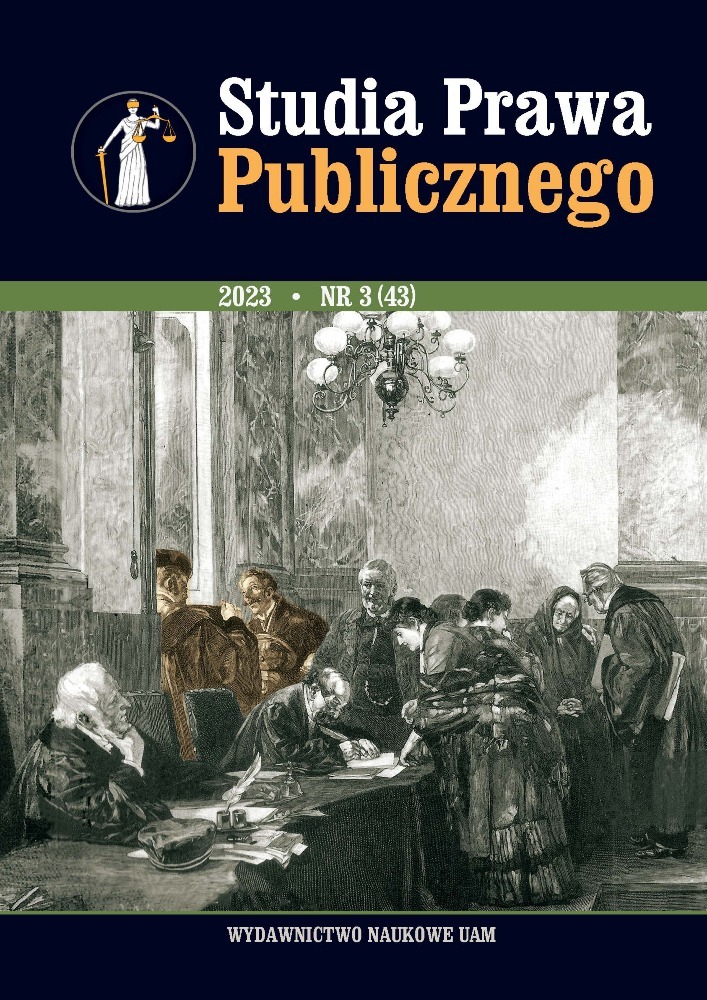Abstrakt
The article aims to discuss the competencies of municipal and county consumer ombudsmen and how they were exercised by both before and under the conditions of the Covid-19 pandemic. The text presents the majority of the results of a survey conducted between 18 February and 4 March 2021, which involved submitting 142 requests for public information consisting of seven questions about the impact of the Covid-19 pandemic on the activities of consumer ombudsmen and their offices. Based on the criterion of population, requests were sent via email to consumer ombudsmen operating in most Polish cities with over 22,000 inhabitants. Requests were standardized as far as possible to obtain an unadulterated response from the ombudsmen. The research material consists of responses to requests for public information. The article is divided into several parts. The first discusses the position, competencies of ombudsmen and the ways in which they perform the tasks entrusted to them, drawing on legal acts, legal doctrine and reports on their activities published by the OCCP on the basis of annual reports submitted by them. The second part presents the results of a study on the impact of the Covid-19 pandemic on the ombudsmen’s activities, particularly focusing on the ways in which they perform their tasks and the changes implemented by them. Finally, based on the considerations made and the results of the research, conclusions are drawn regarding the activities undertaken by consumer ombudsmen in response to the challenges posed by the Covid-19 pandemic, the frequency of choosing specific communication methods and channels used to deliver consumer advices, and the types of new activities undertaken as a result of the Covid-19 pandemic and its associated restrictions. An attempt is made to formulate de lege ferenda conclusions regarding the competence in question.
Finansowanie
Tekst powstał przy wykorzystaniu środków programu Ministerstwa Edukacji i Nauki „Szkoła orłów”.
Bibliografia
Banasiński C. et al., Art. 40, w: Ustawa o ochronie konkurencji i konsumentów. Komentarz, pod red. C. Banasińskiego, E. Piontka, wyd. 1, Warszawa 2009, s. 567–579.
Koroluk S., Powałowski A., Art. 42, w: Ustawa o ochronie konkurencji i konsumentów. Komentarz, pod red. T. Skocznego, wyd. 2, Warszawa 2014, s. 866–871.
Koźmiński K., Rudnicki J., The COVID Crisis as a Sample Tube with Contemporary Legal Phenomena, „Central European Journal of Comparative Law” 2020, nr 1(2), s. 105–121. DOI: https://doi.org/10.47078/2020.2.105-121
KPMG, Nowa rzeczywistość: konsument w dobie COVID-19. Jak zmieniły się zwyczaje zakupowe Polaków w czasie koronawirusa?, b.m. 2020, https://assets.kpmg.com/content/dam/kpmg/pl/pdf/2020/09/pl-Raport-KPMG-Nowa-rzeczywistosc-konsument-w-dobie-COVID-19.pdf (dostęp: 3 VII 2023).
Maziarz A., Zadania samorządu terytorialnego w zakresie ochrony praw konsumentów, „Samorząd Terytorialny” 2012, nr 6, s. 62–69.
Pietraszewski M., Uprawnienia rzeczników konsumentów i Rzecznika Ubezpieczonych do polubownego zakończenia sporów konsumenckich, „ADR. Arbitraż i Mediacja” 2011, nr 3(15), s. 93–108.
Radwański M., Art. 40, pkt 2, w: Ustawa o ochronie konkurencji i konsumentów. Komentarz, pod red. A. Stawickiego, E. Stawickiego, wyd. 2, Warszawa 2016, s. 786–788.
Radwański M., Art. 42, pkt 1.2., w: Ustawa o ochronie konkurencji i konsumentów. Komentarz, pod red. A. Stawickiego, E. Stawickiego, wyd. 2, Warszawa 2016, s. 799–800.
Rzecznik Praw Obywatelskich, Raport RPO na temat pandemii. Doświadczenia i wnioski, Warszawa 2021, https://bip.brpo.gov.pl/sites/default/files/2021-12/Raport_RPO_pandemia_2021.pdf (dostęp: 3 VII 2023).
Sieradzka M., Art. 42, pkt 1.1., w: Ustawa o ochronie konkurencji i konsumentów. Komentarz, pod red. K. Kohutka, M. Sieradzkiej, wyd. 2, Warszawa 2014, s. 746–747.
Urząd Ochrony Konkurencji i Konsumentów, Działania powiatowych i miejskich rzeczników konsumentów w roku 2017 r., Warszawa 2019, https://uokik.gov.pl/download.php?id=19157 (dostęp: 3 VII 2023).
Urząd Ochrony Konkurencji i Konsumentów, Działania powiatowych i miejskich rzeczników konsumentów w roku 2018, https://pap-mediaroom.pl/sites/default/files/attachments/202001/DOC.20200102.34965593.uokik-sprawozdanie-z-dzialalnosci-powiatowych-miejskich-rzecznikow-konsumentow-2018.pdf (dostęp: 3 VII 2023).
Wierzbowski M., Wiktorowska A., Róg-Dyrda J., Grzywacz M., Czynności faktyczne, w: Prawo administracyjne, pod red. J. Jagielskiego, M. Wierzbowskiego, wyd. 2, Warszawa 2020, s. 374–378.
Żądło A., Sposoby prowadzenia edukacji konsumenckiej na szczeblu samorządowym przed i w czasie pandemii wirusa COVID-19, w: Prawo administracyjne – teoria i praktyka, pod red. B. Kotowicza, A. Kurzawy, B. Opalińskiego, Warszawa 2023, s. 247–266.
Licencja

Utwór dostępny jest na licencji Creative Commons Uznanie autorstwa – Bez utworów zależnych 4.0 Międzynarodowe.

